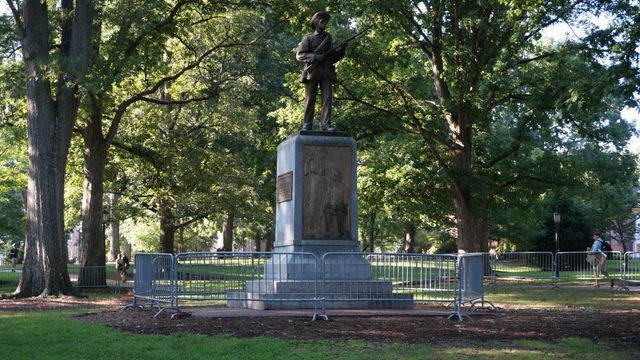'A slap in the face:' UNC hears Confederate statue concerns
A Confederate statue should be removed from its prominent place at North Carolina's flagship public university, two dozen students, faculty members and alumni told trustees Wednesday, calling it a "slap in the face" to the diverse campus.
Nearly 30 speakers addressed the University of North Carolina at Chapel Hill Board of Trustees during a two-hour comment session on the statue known as "Silent Sam," which stands in a main quadrangle. Most opposed the anonymous rebel soldier dedicated in 1913, but two supporters of the monument called it an important memorial.
Student Miriam Madison told the mostly white and male board that the statue makes her feel devalued as a black woman, especially considering its dedication speech by a former Confederate soldier who talked about the "pleasing duty" of whipping a "negro wench" in Chapel Hill.
"Tell me what you stand for, and am I a 'negro wench' to you?" Madison asked the board, which did not take questions.
North Carolina, which ranks among the handful of Southern states with the most Confederate monuments, has been a focal point in the national debate over them following a deadly white nationalist protest in August in Charlottesville, Va. Democratic Gov. Roy Cooper has called for removing Silent Sam and other rebel symbols on public land.
It's not clear what the board could do. Chancellor Carol Folt has previously said state law prevents the school from removing the statue, while Cooper argues that the law would permit the statue to be moved as a safety threat. Some speakers urged the trustees to petition a state Historical Commission that's studying several other Confederate monuments on the grounds of the State Capitol.
Board Chairman Haywood Cochrane opened the session by saying the trustees "care deeply" about campus safety and are committed to telling the "full and accurate story of our university's history." He said the public comment session was convened at Folt's urging.
"This thousands of dollars that we spend on Silent Sam per year is a strong message about what UNC values and is willing to protect over their students – a monument to the ideology that says I don’t belong on this university," UNC-Chapel Hill senior Michelle Brown said. "I’m here to say that I belong on this university."
"There’s absolutely nothing silent about Sam," said O.J. McGhee, chairman of the Carolina Black Caucus. "The statue screams racism and white supremacy. In fact, its silence on freedom, equality and justice has been downright deafening. We should all agree that the pain of someone’s oppression should have never been placed on a pedestal to be celebrated."
Folt ended the meeting by thanking the speakers but didn't say what the next steps could be.
"I know that it took a lot of courage for people to stand up here," she said.
Two speakers supported the Confederate monument, while another argued that protests such as the one against Silent Sam threaten to drown out voices of those who disagree.
One Silent Sam supporter, who identified himself as UNC alumnus James Ward, acknowledged that there was "rampant racism" around the world when the statue was dedicated in 1913 but said it represents an important memorial.
"Most of us look at the statue today and see a memorial to our relatives, our blood kin," said Ward, who is white. "The statue should remain because it is a memorial to these sons of the university. It should remain because it tells a part of the history of the university."
Ward said UNC-Chapel Hill leaders shouldn't be swayed by protesters simple because they shout the loudest.
"Now is the time for this university to say enough is enough, that this university stands for the true diversity of ideas and opinions and accepts all of its history. Monuments from the past are a part of that," he said.
Graduate student and protest organizer Maya Little said the statue symbolizes "the violent oppression of minorities." She said it continues to pose a safety hazard and that demonstrators have been verbally threatened by some who think it should stay in place.
"You cannot claim to care about our First Amendment rights and actively work to subvert them," Little told trustees. "You cannot claim to represent us and ignore racial hostility to your students and faculty."
After the meeting, Little said she was encouraged so many people spoke out. Little, who is black, argues the university has options for moving the statue, such as the one proposed by Cooper.
"I think this university needed to hear from its students," she said, noting that it's taken several months for them to get such a forum. "It's not given us many opportunities to speak."











